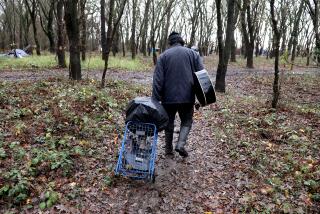Words of Christmas past
Christmas arrives this year at a joyless time for many Californians. The state’s unemployment rate is the highest it’s been in 14 years. Families continue to lose their homes at an alarming rate, with defaults rising again despite government efforts to slow the pace. And steep losses in the stock market have diminished the 401(k) plans of many older residents, delaying their retirements or forcing them to make do with much less.
A glimpse at editorials from Christmases past, however, reminds us that we’ve been through worse times -- the Great Depression, the buildup to World War II, the protracted stagflation of the 1970s. We’re a resilient people, thanks in no small measure to the same qualities that Christians celebrate today: faith, hope and sacrificial love for one another. We look for those qualities again to bring light and promise to all.
1932
What is the song the herald angels are singing to us today? Are they still calling us to rejoice as we rejoiced before this calamity overtook us?
Our family budgets are depleted, not a few pocketbooks are empty, everyone feels the pinch. Want stalks the streets, the cry of the needy is insistent, the means of relief are painfully meager. Yet perhaps those who respond thus are listening to the wrong music. They are hearing only man-made “bells jangled, out of tune and harsh.” ...
The adversity in which we have found ourselves surrounded during the present Christmas season has not been all adversity. It has enabled multitudes to get a better understanding of life outside of their own immediate circle. It has put more of the Christ spirit into Christmas. It has counteracted the selfishness which too much prosperity brings to the surface. ...
The dull-minded may not see, may not hear. Nor the self-centered, nor the anti-social, nor the wastrel, nor the frosty-hearted, nor the iron-heeled. But wise men have seen the Star and good shepherds heard the song.
We may be crowded out with Joseph and Mary, because there is no room in the inn; but it is Christmas in the cattle stalls. There may be no place at the table; but there is room around the manger. We may come to pay our burdensome taxes and be weary and travel-stained; but it is Christmas in our Bethlehem.
When we can turn from the graves of yesterday and from the mirages of tomorrow to the ministry of today, then it will be Christmas in our hearts. Then there will be no more poor, for each will share in the generosity of his fellows. Then there will be but one concern, that none anywhere shall come to want.
Then people will cease to be go-getters and all will hurry up to be go-givers. To help will be the ambition of all. There will be no beggars along the highway and no outstretched hands at the street corners. All will be wealthy in their friends. ...
Then we shall walk in confidence, not in fear. Then open-handed co-operation will be the rule and cut-throat competition the exception. Then the spirit of Christmas, exalted, magnified, will move mankind, not for a day, not for a sea- son, but in every human relation, year in and year out. ...
1936
So great has been the Christmas retail trade in the United States this season that stocks in many lines have been exhausted and factories have been unable to keep up with the demand. Both in volume and dollar-value it has set a six-year record. We may draw different inferences from this statement according to our way of looking at things.
The economist may deplore the failure of our production and distribution system to meet the seasonal emergency. The idealist will see in this rush of shoppers to buy gifts for their loved ones, beyond the capacity of dealers to supply, a new upsurge of the Christmas spirit. The cynic may ask what all this buying and selling has to do with the manger birth at Bethlehem and the promise of “peace on earth.”
It has more to do with the gospel taught by the Prince of Peace than the economists can deduce from the cold figures or the cynics can laugh out of court with their cry of commercialism. The volume of Christmas giving is proportionate to the spirit that inspires it; when the supply cannot meet the demand, it is a gain rather than a loss for Christianity in action.
The buying and selling, so marked a feature of the Christmas festival, has not commercialized Christmas. On the contrary, the spirit of Christmas has enabled the buying and selling promoted by the season. We have not put commerce into the story of the Christ child, we have put the Christ child into the story of commerce. And if we could carry on our business throughout the year with the same good will with which we do our Christmas shopping, the peace on earth heralded by the angels would be ours already. ...
1939
... In this dark year of 1939, we need all the cheerfulness we can summon to combat the sadness and sorrow forced by a cruel war on half the world. We must do all we can to prove that we have not lost faith in the promise of the angels. We cannot do so by succumbing to gloom.
In a land blest with peace and plenty we can still welcome the greatest day on the calendar, not minimizing the sufferings of others or magnifying our own good fortune, with the old familiar greeting: “A Merry Christmas!”
1974
Christmas has always drawn attention to the inequality of life.
In its origins, the simplicity of the manger scene contrasted with the opulence of the three kings and their gifts of frankincense, gold and myrrh. The Gospels of Luke and Matthew dramatize the theme. And likewise the parable of Charles Dickens, telling of the rich merchant, Scrooge, and his rediscovery of generosity.
In this tradition, and from the comfort of our privileged lives, we thought how this Christmas must dawn on other parts of the world. And we recalled --
A choral Eucharist in St. Mary’s Anglican Cathedral, Johannesburg, white and black priests celebrating together at the high altar, and white and black parishioners exchanging the greeting of peace, black hand grasping white hand in brief embrace before each goes out into the street to take separate buses and separate trains and separate cars to separate communities. ...
A cold water shack in a barrio of East Los Angeles, warmed by a kerosene stove, where used toys are the only gifts, where refried beans take the place of roast turkey.
Injustice, hunger, deprivation have been part of the Christmases past as well as present, inevitably brought to mind by men of goodwill as they ponder Christmases yet to come. So with Scrooge, as he saw the past, understood the present, and realized how he could change the future. ... So with us, as the season brings confidence and courage to change the future: That black and white, together in worship, shall not be separated in life; that the hungry shall be fed and the poor clothed and the new opportunities shared with all.
1991
This may be the proverbial season for giving, but Southern Californians have not kept up with their proverbial level of charity.
Giving is down almost everywhere, according to the current issue of the NonProfit Times, a respected trade publication. What timing! People are hurting in poor communities, and that pain is spreading to middle-class and affluent areas. Everywhere you turn there is bad news. General Motors and IBM are eliminating tens of thousands of jobs. The pending merger of Bank of America and Security Pacific threatens to blanket the region with pink slips. Retailing, aerospace and other businesses -- big and small -- are also eliminating jobs.
Who doesn’t know somebody who has lost a job this year? Who isn’t beginning to worry that they could be next in the unemployment line, or worse, the welfare line? Those fears may never materialize, but they prompt deep economic insecurity. Is that inhibiting giving? Are people not contributing because they fear they could be the next to lose a job? ...
Hard times are the very times when even a small contribution can be crucial to those in need. A dollar or a can of food would make a difference at the crowded Salvation Army feeding programs and at other charities. Household discards from closets, garages and storerooms would allow Goodwill to hire disabled people and “socially disadvantaged” workers who in many cases have not finished even grade school.
The pain isn’t seasonal; thus the giving should be year-round. Most economic forecasts for 1992 are chilly indeed. Those who are not in great need simply must help those who are. It is a moral imperative for all of us.
More to Read
A cure for the common opinion
Get thought-provoking perspectives with our weekly newsletter.
You may occasionally receive promotional content from the Los Angeles Times.










